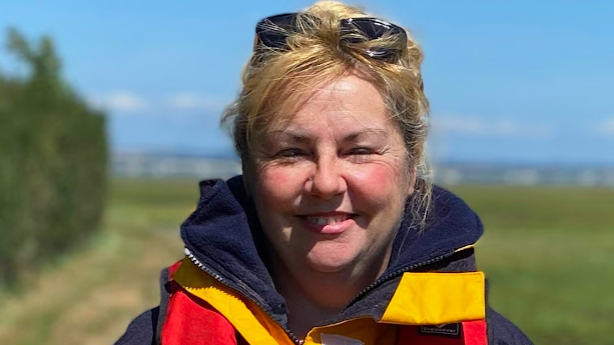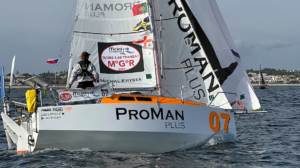Rescued woman speaks out about ‘strong swimmer’ mentality

After Rachael Perrin fell into the sea from a motor cruiser being buffeted by strong waves off the southern coast of the Isle of Wight, she says she ‘feared for her life’. But, unlike many, Perrin was prepared. And even though she caught: “a very fast current and drifted miles and miles very fast, so that the island looked like a rock far away,” having a lifejacket and mobile phone saved her life.
Perrin now advocates for all sailors to be properly equipped. “I have since heard people saying things like, ‘I’m only going over to the Isle of Wight’ or ‘I’m a strong swimmer’,” says Perrin, “but you get cramp from the cold water; my whole body started to cramp and I could hardly hold the phone. People are overconfident of their skills.
“It was by far the most awful moment I have ever experienced,” she says who, along with her partner, Mike Burge, was on route from Portsmouth to Cherbourg on 23 May 2024.
Feeling seasick, Perrin (who had only taken up boating a year before) was at the stern when she went in.
“I was thinking, what the hell’s happened? And when I got to the surface I was panicking. I was shouting but there was no way Mike could hear me over the noise of the engine.”
But, Perrin was wearing a lifejacket and, crucially, had her mobile phone hanging in a waterproof case round her neck
As the automatically inflated lifejacket kept her afloat, Perrin was able to call 999 for HM Coastguard.
Mobile phone in waterproof case saves life
“If I did not have my phone, I think the length of time I would have been in the water means hypothermia would have killed me. The lifejacket kept me afloat but without my phone they would have found a dead body,” she says.
Once Perrin had raised the alarm at about 13:45, HM Coastguard coordinated the search and rescue operation, sending two helicopters and a fixed-wing aircraft.
The RNLI’s all-weather lifeboats from Bembridge and Yarmouth were also sent alongside the Sandown and Shanklin Independent Lifeboat and two nearby vessels, says HM Coastguard who first published details of this incident in its blog.
Perrin kept talking to the HM Coastguard operations room, passing on clues to her location such as describing two large vessels she could see and estimating how far she was drifting from land.
“The fact that I could talk to someone who could give me a live update made the difference to stopping me freaking out. I knew they were looking for me and they would find me. That was hugely comforting.
“When I was near the Isle of Wight I caught a very fast current and drifted miles and miles very fast, so that the Island looked like a rock far away. I found it terrifying being that far from land and not being in a boat. I knew it was far too far away to try and swim.
“I was listening to the voice from the operations room. I was getting hysterical but he was telling me to breathe and to let the lifejacket do the work of keeping me afloat. HM Coastguard were amazing, such an asset.”
Perrin was sighted at about 15.50 by one of the helicopters. At that time she says she had intense cramp from the cold.
“When the helicopter did start to get close it was a massive relief: they’re going to get me, I am going to be alright. But relief is the wrong word – it was so much more than relief.”
Perrin says she could hear the rotors and feel the spray.
“The next thing I knew, an arm was coming round me almost out of nowhere – it was the winch paramedic – and really quickly they got me into the helicopter.
Despite arriving cold, sick from sea water and exhausted at St Mary’s Hospital, Newport, she went home after a night’s stay.
Staying as safe as possible at sea
Perrin’s advice:
- Keep your mobile phone to hand in a waterproof case on a lanyard
- Always wear a lifejacket with the straps correctly fitted
- Have a location phone app or carry a registered Personal Locator Beacon (PLB)
- Check equipment is in date, such as lifejacket gas cannisters
- Agree a process to regularly check on crew members when at sea
Others have added Perrin’s list on social media, and advise giving some thought as to where a phone or VHF is kept, making sure it can be reached when a lifejacket inflates and making sure that a PLB is fitted to a lifejacket.
In 2021, a swimmer’s pink swim hat was praised as being the source of her rescue after she was swept out to sea at Little Fistral beach in Cornwall. The woman’s pink tow float and pink hat were credited for making her easily visible and thus helping to save her life. Continue reading MIN’s latest articles about the work of coastguards around the world and the rescues that they undertake.












Mobile phone signal is poor unless close to land.
Carrying a waterproof handheld VHF would be better option.
Only if there was another vessel nearby